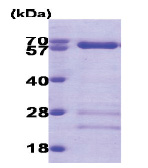SMAD4 (1-552, His-tag) Human Protein
Other products for "SMAD4"
Specifications
| Product Data | |
| Species | Human |
| Expression Host | E. coli |
| Expression cDNA Clone or AA Sequence |
MGSSHHHHHH SSGLVPRGSH MDNMSITNTP TSNDACLSIV HSLMCHRQGG ESETFAKRAI ESLVKKLKEK KDELDSLITA ITTNGAHPSK CVTIQRTLDG RLQVAGRKGF PHVIYARLWR WPDLHKNELK HVKYCQYAFD LKCDSVCVNP YHYERVVSPG IDLSGLTLQS NAPSSMMVKD EYVHDFEGQP SLSTEGHSIQ TIQHPPSNRA STETYSTPAL LAPSESNATS TANFPNIPVA STSQPASILG GSHSEGLLQI ASGPQPGQQQ NGFTGQPATY HHNSTTTWTG SRTAPYTPNL PHHQNGHLQH HPPMPPHPGH YWPVHNELAF QPPISNHPAP EYWCSIAYFE MDVQVGETFK VPSSCPIVTV DGYVDPSGGD RFCLGQLSNV HRTEAIERAR LHIGKGVQLE CKGEGDVWVR CLSDHAVFVQ SYYLDREAGR APGDAVHKIY PSAYIKVFDL RQCHRQMQQQ AATAQAAAAA QAAAVAGNIP GPGSVGGIAP AISLSAAAGI GVDDLRRLCI LRMSFVKGWG PDYPRQSIKE TPCWIEIHLH RALQLLDEVL HTMPIADPQP LD
|
| Tag | His-tag |
| Predicted MW | 62.6 kDa |
| Concentration | lot specific |
| Purity | >90% by SDS - PAGE |
| Presentation | Purified |
| Buffer | Presentation State: Purified State: Liquid purified protein Buffer System: 20 mM Tris-HCl buffer (pH 8.0) containing 20% glycerol |
| Preparation | Liquid purified protein |
| Protein Description | Recombinant SMAD4 protein, fused to His-tag, was expressed in E.coli and purified by using conventional chromatography techniques. |
| Storage | Store undiluted at 2-8°C for up to two weeks or (in aliquots) at -20°C or -70°C for longer. Avoid repeated freezing and thawing. |
| Stability | Shelf life: one year from despatch. |
| Reference Data | |
| RefSeq | NP_005350 |
| Locus ID | 4089 |
| UniProt ID | Q13485, A0A024R274 |
| Cytogenetics | 18q21.2 |
| Synonyms | DPC4; JIP; MADH4; MYHRS |
| Summary | This gene encodes a member of the Smad family of signal transduction proteins. Smad proteins are phosphorylated and activated by transmembrane serine-threonine receptor kinases in response to transforming growth factor (TGF)-beta signaling. The product of this gene forms homomeric complexes and heteromeric complexes with other activated Smad proteins, which then accumulate in the nucleus and regulate the transcription of target genes. This protein binds to DNA and recognizes an 8-bp palindromic sequence (GTCTAGAC) called the Smad-binding element (SBE). The protein acts as a tumor suppressor and inhibits epithelial cell proliferation. It may also have an inhibitory effect on tumors by reducing angiogenesis and increasng blood vessel hyperpermeability. The encoded protein is a crucial component of the bone morphogenetic protein signaling pathway. The Smad proteins are subject to complex regulation by post-translational modifications. Mutations or deletions in this gene have been shown to result in pancreatic cancer, juvenile polyposis syndrome, and hereditary hemorrhagic telangiectasia syndrome. [provided by RefSeq, Aug 2017] |
| Protein Families | Druggable Genome, Transcription Factors |
| Protein Pathways | Adherens junction, Cell cycle, Chronic myeloid leukemia, Colorectal cancer, Pancreatic cancer, Pathways in cancer, TGF-beta signaling pathway, Wnt signaling pathway |
Documents
| FAQs |
| SDS |
Resources
Recombinant Protein Resources |
{0} Product Review(s)
0 Product Review(s)
Submit review
Be the first one to submit a review
Product Citations
*Delivery time may vary from web posted schedule. Occasional delays may occur due to unforeseen
complexities in the preparation of your product. International customers may expect an additional 1-2 weeks
in shipping.






























































































































































































































































 Germany
Germany
 Japan
Japan
 United Kingdom
United Kingdom
 China
China
